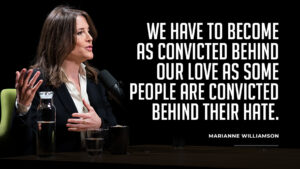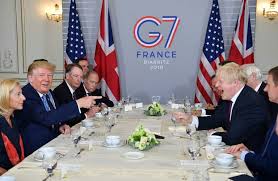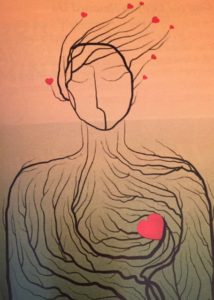Evil
Tuesday, April 5, 2022
April 5, 2022I often contemplate, particularly now, where our country would be without the influences of Rupert Murdoch and the state media he has created in the U.S. He began his residency in 1974 and became a U.S. citizen in 1985 after relinquishing his Australian citizenship, the legal requirement for US television network ownership. He established the FOX News Channel in 1996, the same year former president Bill Clinton signed the Telecommunications Act, overhauling 60 years of regulation. Murdoch thrived. And he is destroying us.
Astute and true:
New Zealand Prime Minister Jacinda Ardern said her country doesn’t have to deal with the “rage of older white men” because “we’ve never allowed Rupert Murdoch to set up a media outlet here.”
The veracity of the quote is being questioned. Regardless, he shouldn’t have been able to start his media empire here, and Clinton shouldn’t have sold us out. Cue Roger Ailes and Newt Gingrich and Rush Limbaugh. And here we are.
•DT
•Insurgency
•Plague
•Climate Crisis
•War
Our existential soup. Could we please hold off on adding any more ingredients? Maybe let this batch simmer for awhile.
Gen. Mark A. Milley on the Russian invasion of Ukraine: “We are witness to the greatest threat to peace and security in Europe – and perhaps the world – in my 42 years of service in uniform.”

Ukainian President Volodymyr Zelensky (C) speaks to the press in the town of Bucha, northwest of the Ukrainian capital Kyiv, on April 4, 2022. – Ukraine’s President Volodymyr Zelensky said on April 3, 2022 the Russian leadership was responsible for civilian killings in Bucha, outside Kyiv, where bodies were found lying in the street after the town was retaken by the Ukrainian army. (Photo by RONALDO SCHEMIDT / AFP)
Anne Baring, The Dream of the Cosmos-A Quest for the Soul:
p. 273
“Evil has its origin in this deeply unconscious predator-prey pattern of behavior. I think that, in relation to the harm we are capable of inflicting on the human beings, evil may be defined as the act of inflicting terror, suffering, humiliation, torture or yeah on an individual or group of individuals ranging in kind from the murder of a child to the atrocities currently taking place in Syria (2012) to the viciously cruel attacks on others on Facebook and Twitter. One of the most difficult things to recognize is that each one of us in capable of acting in a hateful cruel or evil way, or of being complicit in these ways of behaving, whether as an individual or as the member of a government, institution, corporate body or nation. […] The fact that an International Court of Justice now exists to try those who commit such crimes against human unity is evidence of collective progress in moral awareness. But this progress requires perpetual vigilance lest we slip back into old unconscious habits. [2013]
Ukrainian President Volodymyr Zelenskyy spoke to the United Nations Security Council today. Here is the link to watch his speech and listen to the statements by various countries after he spoke. There were technical issues with the video he wanted to share with the council, at about 1:15:00 into their remarks, the video was shown. We want to look away, we can not. Ever.
From The Hill:
‘If Russia is not removed from the council, Zelenskyy said the body should just be dissolved.
“If there is no alternative and no option, then the next option would be dissolve yourself altogether,” he said.
The Ukrainian president proposed a global conference to convene in Kyiv to discuss reforms to the United Nations.
“It is now clear that the goals set in San Francisco in 1945 for the creation of a global security international organization have not been achieved, and it is impossible to achieve them without reforms,” he said.’
“I don’t know where we fall in the legacy of life.”
-Sean PennWe crave leadership, and authenticity.
Matthew Fox, a spiritual theologian.
“Rabbi Heschel teaches that a prophet’s primary task is to interfere. Julian of Norwich, by calling us to interfere with patriarchy and heal the wounds that it has wracked upon human history and the human soul and the earth, beckons u from folly to wisdom. Are we listening?”
Fr Richard Rohr:
“Stage One people: At this level tend to be preoccupied with the pleasure, security, safety, and defense of their material state. And that extends to their morality: If it makes me feel secure, it is moral. Life is largely about protecting myself. This is seen in the endless need for war and guns, but little need for education culture, the arts, and spirituality. Stage One people are mostly dualistic, either/or thinkers, and frankly represent a rather sizable minority of humans. Their morality largely has to do with maintaining their group, and regarding their group as superior.”
ℒℴve.
February 21, 2022“The chain reaction of evil — hate begetting hate, wars producing more wars — must be broken, or we shall be plunged into the dark abyss of annihilation.”
—Dr. Martin Luther King Jr.
‘Extreme political polarization. Weaponized misinformation. Media incentivized to divide. And growing inequality. Our democratic experiment has seen better days. How do we reimagine it for the betterment of all?
Spiritual thought leader, activist, and political writer Marianne Williamson says it begins with love.’
-Rich Roll
Deliver us from evil.
August 25, 2019“You cannot be a (wo)man of faith unless you know how to doubt. You cannot believe in Gaia unless you are capable of questioning the authority of prejudice, even though that prejudice seems to be religious. Faith is not blind conformity to a prejudice–a ‘pre-judgment.’ It is a decision, a judgment that is fully and deliberately taken in the light of a truth that cannot be proven.”
-Thomas Merton, New Seeds of Contemplation
[G7 in France]
But deliver us from evil, past, present, and to come.
We must strive to overcome evil, but even our best efforts will require Gaia’s help.
The Lord said to Evil, “‘Where did you come from?’ Evil answered, ‘From prowling about on the earthmovers going back and forth on it.” Job 1:7
Cosmology: Part I
The Change of a World View
Fr. Richard Rohr, Center for Action & Contemplation
Today, every academic, professional discipline—psychology, anthropology, history, the various sciences, social studies, art, and business—recognizes change, development, and some kind of evolving phenomenon. But in its search for the Real Absolute, much of Christian theology made one fatal mistake:
It imagined that any notion of God had to be unchanging, an “unmoved mover,” as Aristotelian philosophy called it.
There’s little evidence of a rigid God in the biblical tradition or the image of Trinity—where God is seen as an active verb more than a substantive noun. But many Christians seem to have preferred a stable notion of God as an old white man, sitting on a throne—much like the Greek god Zeus (whose name became the Latin word for God or “Deus”)—a critical and punitive spectator to a creation that was merely a mechanical clock of inevitable laws and punishments, ticking away until Doomsday.
We need a new way of thinking about the universe and our place in it. To begin our two weeks on this theme, I offer a clear and concise description of our changing worldview from Australian theologian Denis Edwards (I waited in a long line once just to thank him for his fine work):
Our theological tradition has been shaped within the worldview of a static universe. The great theological synthesis of St. Thomas Aquinas [1224–1274], for example, was formed within a culture which took for granted that the world was fixed and static, that the Sun and the Moon and the five known planet stars revolved around the Earth in seven celestial spheres, moved by angels, that beyond these seven spheres there were the three heavens, the firmament (the starry heaven), the crystalline heaven, and the empyrean, and that there was a place in the heavenly spheres for paradise. It was assumed that human beings were the center of the universe, that Europe was the center of the world, and that the Earth and its resources were immense and without any obvious limits.
By contrast, we are told today that the universe began with a cosmic explosion called the Big Bang, that we live in an expanding universe, with galaxies rushing away from us at an enormous rate, that the Earth is a relatively small planet revolving around the Sun, that it is hurtling through space as part of a Solar system which is situated toward the edge of the Milky Way galaxy, that we human beings are the product of an evolutionary movement on the Earth, and that we are intimately linked with the health of the delicately balanced life systems on our planet.
The shift between these two mindsets is enormous. It needs to be stressed that most of our tradition has been shaped by the first of these, and even contemporary theology has seldom dealt explicitly with the change to a new mindset. . . .
We have no choice but to face up to the ecological crisis which confronts us. Religious thinkers . . . are searching for a new synthesis of science and faith, a new cosmology, and a “new story.” [1]
[1] Denis Edwards, Jesus and the Cosmos (Paulist Press: 1991), 3-5.
Adapted from Richard Rohr, “Evolution Is Another Name for Growth,” “Evolutionary Thinking,” Oneing, vol. 4, no. 2 (CAC Publishing: 2016), 111-112.
Image credit: Starry Night Over the Rhône (detail), Vincent van Gogh, 1888, Musée d’Orsay, Paris, France.
‘Nurture this voice.’
October 12, 2017If you have an inner voice telling you that how this country is now is not right, / that these shootings aren’t right, / That racism isn’t right, / That treating immigrants as they are isn’t right, / honor that voice. / It’s your heart reminding you that love is real, that there is a more beautiful way to live. / Nurture this voice, and link it to others. / We are not alone. / We are not bound to live in a starless night. / Love will win. InshaAllah. / It will come into public, as justice.
-Omid Safi
•
On Being Staff:
“In response to the mass shooting in Las Vegas, we offer this special commentary. President Trump called it “an act of pure evil.” Courtney questions why we use the word “evil” to explain such violence. And, she argues, why we should stop making that moral bargain. I realize this is a complex issue. How do you think through it?”
The Mental Bargain We Make When We Use the Word ‘Evil’
by Courtney E. Martin
On Being
“’Evil’ is a cop-out. It distances us from asking hard, important, and specific questions about how this could have been prevented and what each of us can do to save lives — actual human lives — in the future. … If there is evil here, it is complacency, and it is collective.”
I don’t want to make that moral bargain in my brain anymore. I’m not going to call Stephen Paddock “evil,” and I’m not going to sit idly by when anyone else does — whether that person is my president or my neighbor. Not for his sake, but for my own. I refuse to live in a moral world of my own making where mass shootings are inevitable and don’t have anything to do with me. Instead of numbing myself with that powerful little word — “evil” — I’m going to dig into moral and strategic questions like:
Why did Paddock have 23 firearms (including an AR-15-style assault rifle) and hundreds of rounds of ammunition? Why does anyone have 23 firearms and hundreds of rounds of ammunition?
Why can’t this country agree on common sense gun legislation that would prevent the mass murder of innocent people?
What was Paddock’s mental state? Who knew about it? Why didn’t he have connections with people who were more aware of the dangers of his mental state and capable of getting him help?
Is mental illness on the rise among white men and, if so, why?
What kind of funding goes into addressing the mental health of men like Paddock?
What have I, personally, done in the wake of mass shootings in the past? How can I do something different?
“Evil” is a cop-out. It distances us from asking hard, important, and specific questions about how this could have been prevented and what each of us can do to save lives — actual human lives — in the future.
None of us with the power to vote, organize, and advocate is innocent in a country where this is not only possible, but frequent. Paddock intersected with our health systems, our schools, our gun policies before he put his finger on that trigger. If there is evil here, it is as subtle as you or me, anyone with a beating heart, pointing a finger at one dead man as if the moral responsibility lay only with his cold corpse.
If there is evil here, it is complacency, and it is collective.
[full column: https://onbeing.org/blog/courtney-martin-the-mental-bargain-we-make-when-we-use-the-word-evil/]
On Being Staff:
•
“I think what we’re seeing actually is not compassion fatigue, but empathic distress.”
-Joan Halifax
Buoyancy Rather Than Burnout in Our Lives
‘It’s easy to despair at all the bad news and horrific pictures that come at us daily. But Roshi Joan Halifax says this is a form of empathy that works against us. There’s such a thing as pathological altruism. This zen abbot and medical anthropologist has nourishing wisdom as we face suffering in the world.’
[full audio: https://onbeing.org/programs/joan-halifax-buoyancy-rather-than-burnout-in-our-lives-oct2017/]




